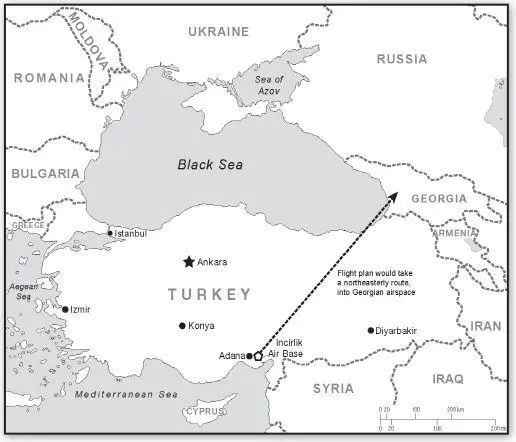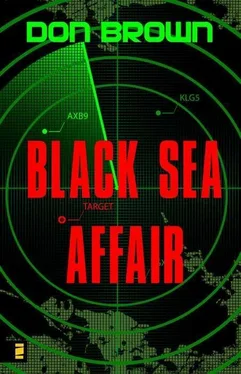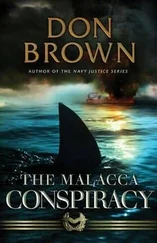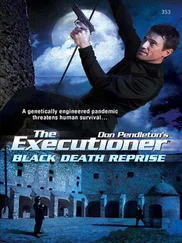Detection could not be risked.
Therefore, Pete had ordered that Honolulu turn off her active sonar. The entire ascent operation was being driven by a GPS homing device positioned inside the Volga River that was feeding data to computers in the Honolulu's control room. The idea was to bring the submarine up just under the bottom of that GPS device.
As a human backup to the GPS, a team of Navy SEALs, decked in black scuba gear and oxygen tanks, swarmed outside the submarine. They swam with powerful underwater lights and underwater transmitters. These transmitters provided contact directly to the bridge of the freighter and the control room of the submarine.
If the ascent was off target, the SEALs could press a transmitter on their watches, which would alert the sub to implement an emergency dive through the water to avoid the collision.
That was the plan anyway.
"Eighty-five feet."
"Slow and easy, " Pete said. "Easy does it."
"Eighty feet."
Something felt wrong. The sub seemed to be ascending too fast.
"Seventy-five feet."
"Easy. Reduce the blow a bit." A lower air-rate blown into the ballast should slow things down.
"Seventy feet."
An alarm buzzer sounded on the control panel. One of the Navy SEALs swimming outside the submarine had pressed his emergency transmission button. The SEALs had spotted trouble in the ascent.
"Sound collision alarm!"
The alarm siren blared throughout the submarine. The siren started with a very low pitch and continued to a high shrill, then repeated itself.
"Collision alarm! Collision alarm! Rig ship for impact!" Alarms rang all over the ship. Like firemen rushing into action at the news of a blazing structure, men's feet trampled all over the steel grated decks, rushing to their stations for a collision.
"Execute emergency deep!" Pete's order rung over the 1MC, over the sound of the claxons, trampling feet, and ringing bells.
"Emergency deep. Aye, Captain."
"Sixty-five feet."
"Wrong way!" Pete snapped. "We're continuing to rise. Emergency deep! Flood ballast tanks! Now!"
"Sixty feet."
"Execute emergency deep! Now!" Pete slammed his fist against the railing in the control room. Like a fast-moving elevator, the boat kept rising. This was taking too long. Time was running out.
"Fifty-five feet."
"Emergency deep!" The chief-of-the-watch's voice rang throughout the ship over the 1MC.
"Ahead full!" Pete ordered. The cavitation bell rang three times, alerting the throttle man in the aft of the engine room to bring the ship to full power.
"Fifty feet!"
"Rig for impact!"
Water flooded the main ballast tanks. In an instant Honolulu's nose dipped dramatically. Clipboards, coffee mugs, and anything else not buckled down slung across the control room. The sub dropped, angled nose-first, like a cart on a roller coaster. Pete grabbed the mast in the center of the control room, hanging on and praying as his boat plunged to a depth of four hundred feet.
Incirlik Air Base Adana, Turkey
Captain A. J. Riddle, United States Air Force, throttled the F-15E Eagle slightly forward, to the number one waiting position at the end of the three-thousand-meter runway.
Riddle had just reported for duty last week from Seymour Johnson AFB in North Carolina. His transfer to the U.S. Air Base at Incirlik, strategically located less than fifty miles from the aqua-blue waters of the Mediterranean and less than one hundred miles from the northeastern border of Syria, provided the best opportunity for aerial combat, he had figured.
Captain Riddle was itching for some action. He had expected to tangle with the Syrians or the Iranians. He had not expected this.
Riddle unrolled his navigational chart for a last glance at his flight plan.

This flight plan would take him on a northeasterly route, directly into Georgian airspace.
Georgia was a tiny border country. Barely one hundred miles of it separated the Turkish and Chechen borders – the distance of a millisecond, or so it seemed to a supersonic jet fighter.
Riddle knew what loomed on the northern side of the Georgian border. Formidable Russian MiG-29 jets, all intent on defending what they considered their territory, filled the Chechen airspace. This would be like lighting a sparkler while pumping your gas.
A sparkle against a fume – and poof.
If the president wanted U.S. warplanes patrolling Georgian airspace, and if those orders included a "weapons free" to fire if fired upon, then so be it. Captain Riddle was trained to take on and defeat any fighter pilot from any air force in the world. But the Russians? The Cold War was supposed to be over. Wasn't it?
A. J. Riddle had supreme confidence in his abilities to engage and defeat a MiG-29. But if he shot one down, then what?
If he shot down an Iranian jet, what were the Iranians going to do about it? Invade San Francisco? Shoot down a Russian jet, and the problem was escalation. What if one of his Sidewinders ignited World War III?
From the ready position at the end of the runway, Riddle looked up. Another giant C-17 Loadstar from the States glided in for a landing. The 82nd Airborne Division was staging at Incirlik. Within the next few days, the division would be ferried by helicopter to points in northeastern Turkey.
"Eagle One. Incirlik Tower. You are clear for takeoff. Runway five-nine. Eagle One, you may proceed."
"Incirlik Tower. Eagle One, roger that."
Captain Riddle pushed full throttle. The Eagle's engines screamed, pushing him down the runway in a great roar, gathering tremendous speed. The F-15 rocketed skyward.
A few minutes later, Riddle banked the plane to the northeast, then prayed that he would see no Russians.
The USS Honolulu The Aegean Sea
This time, the ascent had gone more smoothly. At least so far, they were on target. No abort signals from the SEAL team.
Yet.
"Ten feet, " the diving officer was saying. "Still ascending. Five feet. Three feet."
A scraping, thuddish sound reverberated throughout his boat. Pete grasped the periscope tube in the center of the control room. The men at their watch stations anxiously listened for further sounds that would indicate the submarine was being torn apart by the heavy freighter.
"Contact. Skipper, we have contact!"
In the dim light of the control room, their eyes danced upward, nervously.
Another scraping thud shook the boat. Men wiped their foreheads. Some breathed heavily. None said a word.
The silence was deafening.
Static from the radio crackled the silence.
"The eagle has landed. Repeat, the eagle has landed."
Cheering broke out in the control room. Pete allowed a smile to cross his face. The first dangerous stage of the mission was over. Pete uttered a silent prayer of thanks, then raised his hands, palms down, signaling for quiet in the control room.
"Magnificent job, gentlemen. Now let's enjoy the ride – and hope that we make it through the Bosphorus."
The Alexander Popovich
Somewhere in the Black Sea
Masha sat on the small single bed in her wardroom. Her hands shook uncontrollably and her knees were knocking.
Her Black Sea cruise with her orphans, something that they had looked forward to with uncontrolled anticipation, had become a surrealistic nightmare. Would she become a victim like in those American horror movies? Would they toss her body to the sharks?
How could this be? What about the twelve precious young souls that she was responsible for? What if they killed her? Would her children then disappear over the side of the ship?
The young man standing outside seemed nice enough. But Aleksey Anatolyvich worked for the enemy. Should she kill him or befriend him? Or should she kill the captain or the first officer or whomever on the bridge that was advocating her immediate death?
Читать дальше













